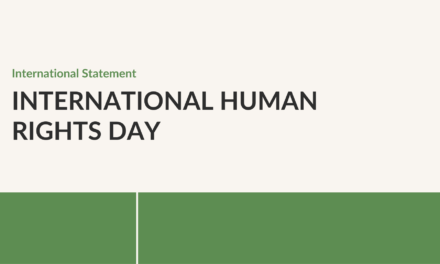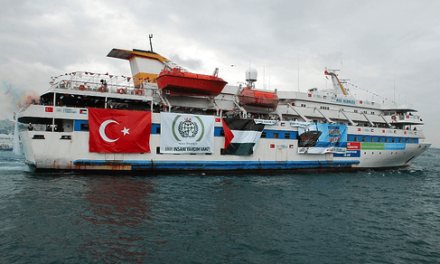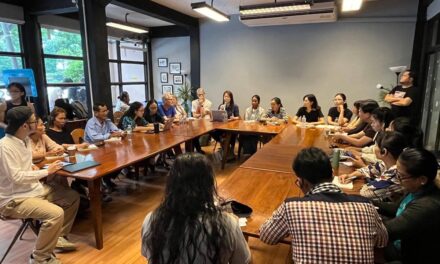by: Thomas Sommer*
A Coalition of Peace
The Freedom Flotilla for Gaza is an international coalition of peace activists determined to end the blockade on Gaza imposed by the State of Israel last 2007. Made up of mostly European and Mediterranean organizations and movements, the coalition also hails members from the United States and other countries.
At the beginning of April, the Turkey-based IHH (Insani Yardim Vakfi) organization, the European Campaign to End the Siege on Gaza (ECESG), the Greek Ship to Gaza campaign, the Swedish Ship to Gaza campaign and the Free Gaza Movement, formed the Freedom Flotilla for Gaza coalition to send about a dozen boats carrying more than 5,000 tons of cargo to Gaza. This brought together yearlong efforts by the different movements. In the end, there were eight boats: two Greek ships, three Turkish ships, one Irish and two American boats, carrying all in all 10,000 tons of aid including medical supplies, construction materials, prefab homes and school materials and 700 passengers from 50 countries. The passengers were peace activists, parliamentarians, a Nobel laureate and journalists. They were bringing a message of hope, love and solidarity from the world over to the 1.5 million imprisoned people of Gaza.
The objectives of the Flotilla were simple: 1) to urgently respond to the dire situation of the people of Gaza; 2) to put an end to the blockade; and 3) to highlight the complicity of governments around the world in allowing this blockade to last this long despite the suffering of the people of Gaza.
The Flotilla by itself was a success as it demonstrated the capacity of ordinary people around the world to accomplish a concrete and massive an expression of solidarity. It was no mean task to bring together hundreds of people from across the world and collect material aid of this size and finally go through all the obstacles of putting it all together into a coalition of ships travelling from different ports.
The solidarity with which it happened was also inspiring. Cargo was being loaded into ships by trade unions for free, ordinary people were donating money, materials and their time. And there was also widespread support from thousands more who could not get on the ships.
The Violent Response
Of course it was not easy. We encountered many problems but despite the seemingly endless obstacles at the very last minute, the Flotilla finally set sail for Gaza. The energy and excitement of the people in the ships was unbelievable. We were all looking forward to delivering the aid and finally seeing the people of Gaza.
We knew, however, from all the threats of the State of Israel that they were going to try to block us. We knew it was very possible that they would seize our boats and cargo or turn us back. But not in our wildest imaginations did we expect the violence they were going to use to stop us.
On that fateful early morning of Monday, May 31, as our coalition was sailing in international waters, more than 80 miles away from Gaza, we had a crude awakening to the violence of the State of Israel. We saw lights from afar and in minutes Israeli commandos were on our ships. On the Greek cargo ship Sofia, that I was in, we could see the Turkish passenger ship Marmara being boarded and, shortly after, we could hear explosions and what seemed like gunfire. We were too far away to realize that people were getting killed. For our part, the thirty of us who were on the cargo ship ran to the deck and linked arms and formed a human wall to protect our captain. The Israeli commandos proceeded to break the chain by hitting four of our friends with tazers and then the others with paint ball guns at close range and then, finally, pointing real guns at us, as if saying they were done playing and that this was the real thing. At this point some of our friends were being kicked and beaten and, with the very real threat of live ammunition, we had no choice but to break the chain. Soon the ship was taken over.
We then made the 10-hour journey to the Israeli port of Ashdof where hundreds of Israeli soldiers were waiting for us. Again, several of us were beaten, especially some of the main organizers and some seemingly chosen at random, most likely with the aim to instil fear that at any moment any one of us could be next.
We were then all transported to the Beer Sheva prison where we were all detained. We were prisoners and seemingly with no way out. They had taken our passports, our identity cards, our phones, cameras, computers, bags – all we had were the shirts on our backs.
International Outrage
The next day the Israeli and Palestinian lawyers arrived and so did the diplomats from the different embassies. The lawyers were telling us that they were going to help us and that they were proud of us. The diplomats frantically trying to sort out which of the 700 prisoners were their nationals. It was only at this time that we learned of the international outrage over the attack on the Flotilla and only at this time that we found out that some of our friends had died and that others were critically injured.
Soon after, most of us were at the Tel Aviv airport being deported to Turkey or Greece. Turkey had apparently told Israel that they would accept everyone, papers or no papers and that they would ensure they got back to their home countries safely. Not all of us knew this and so for us who had no passports — as the Israelis claimed that they could not locate our passports — were not sure how to get out of Tel Aviv. Personally, I had the Greek comrades and Greek Ambassador to thank for getting us out of there and into Athens as the Greek Ambassador took us French nationals under his wing and took us with the Greeks on their plane back to Athens. The French consulate in Israel is now saying that they were trying to help us, but one thing for sure: my French comrades and I got to Athens because of our Greek comrades.
Once we got to Athens, there was a huge demonstration hailing us as heroes. Then finally seeing a newspaper, we saw that there were demonstrations in so many cities around the world all condemning the attack on the Flotilla and calling for an end to the blockade on Gaza. We also saw that a number of countries had ended diplomatic relations with Israel such as Turkey and South Africa. Greece had cancelled military exercises with Israel and was threatening to end diplomatic relations as well. Ireland had issued a strong statement. The European Union called for an independent inquiry, and the United Nations convened a Security Council meeting to discuss the situation.
A Turning Point
The attack on the Flotilla marks a turning point in the campaign to end the blockade and for the larger struggle for Palestine.
In December 2008 when Gaza was razed to the ground, thousands went to the streets to raise their voices and express their indignation. But many governments stood idly by, complicit in their silence. The blockade has made it nearly impossible to rebuild Gaza. As a special report “Gaza abandoned, no reconstructions, no reparations, no more excuses”, (see http://jfjfp.com/?p=8623) details, nothing or very little has been done to rebuild Gaza because of the Israeli siege.
A year later in December 2009, more than 1,400 people joined together in Cairo with the intention to break the siege and bring solidarity to the people of Gaza. They were stopped at the border.
A few months later, hundreds joined the Flotilla to bring more than 10,000 tons of material aid. This time however, the violence and the brazen attack by the State of Israel on humanitarian boats brought the issue of Gaza into the headlines. It is not without sadness to realize that it takes the loss of life of international peace activists to highlight the plight of Gaza where hundreds have died and continue to suffer in desperate conditions.
The tragic loss of life however has forced governments to break their silence and to begin questioning the blockade. Governments such as Turkey, South Africa and Greece have taken strong positions against the actions of Israel. Even the United States, a staunch ally of Israel, has stated that the blockade on Gaza is unsustainable and should be lifted.
The question of boycotting the State of Israel has become less marginal and more widely discussed by civil society and movements around the world. Today, more and more are discussing the merits of a boycott until the blockade on Gaza is lifted. Some are likening the situation to the time of the Apartheid in South Africa when international outrage was such that a boycott on South Africa became so widespread that South Africa had no other choice than to end the Apartheid.
This marked change in the international political atmosphere should be seized as our moment to forge on and fight even harder to end the blockade on Gaza. Now is the moment to increase the already mounting pressure on our governments and the United Nations to demand that Israel end its siege on Gaza.
The Freedom Flotilla for Gaza may have been stopped with tragic consequences but it has inspired us to persevere. More than ever, we are determined to continue the struggle for the people of Gaza.
* Thomas Sommer is a Research Associate with Focus on the Global South and a member of the International Civilian Campaign for the Protection of Palestinian People (CCIPPP). He was a part of the Freedom Flotilla for Gaza.









